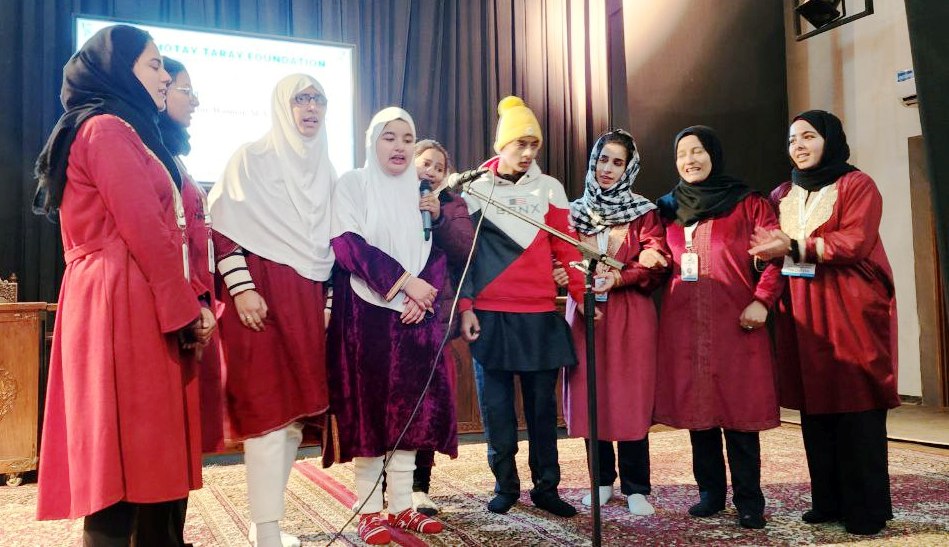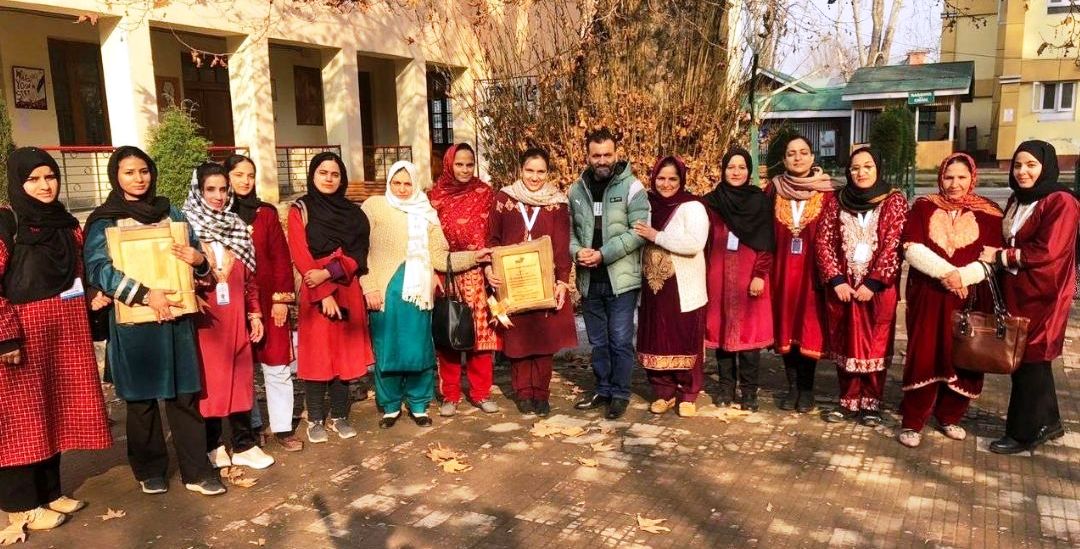For scores of children requiring a special system of education and skill training Chotay Taray Foundation has remained an address of trust and credibility. Sammah Masoodi visited the NGO after it completed 16 years of uninterrupted work in an area that people rarely consider

In Chotay Taray Foundation (CTF), Ayesha’s hands danced like butterfly wings, her tiny legs exploring the hall freely—a sanctuary where her body and spirit found nurture and love. She is one of the dozens of specially-abled children who are growing in a distinct environment and pick up the basic skills of facing life challenges in future, a space that Kashmir lacked for a long time.
Arjumand Makhdoomi, a 20-year-old at the Regional Transport Office (RTO), witnessed a life-altering shift, noting a surge in special children in his community, especially a child with Down’s syndrome. Inspired by a Dutch woman’s vision for rehabilitation in Kashmir, Makhdoomi established the CTF, Kashmir’s first rehabilitation centre for special children. “The absent support for pregnant women contributes to a rise in special children,” he stressed, highlighting the impact of curfews, strikes, and power outages on the growing number of differently-abled children in Kashmir.
On May 5, 2000, CTF was seeded strictly as per the vision crafted by Makhdoomi and his like-minded friends,a determined effort to build a special school with precision. Branded Chotay Taray (Little Stars) by Makhdoomi’s brother, the organization officially bloomed on November 16, 2006. From a lone room in Jawahar Nagar, Kunash Manzil, caring for three children, the journey faced staff challenges, resolved by recruiting a special educator from Delhi and brick-arranging assistance. Evolving into a multi-story structure, CTF became a haven for special children, transcending challenges during the 2014 flood and resiliently relocating to Baghat, Barzulla. Now, Bemina hosts CTF, a testament to their enthusiasm and determination.
“In Kashmir, securing a room is a challenge due to concerns about the children’s behaviour,” shared Makhdoomi, his words tinged with sadness. “Initially, the response was minimal. Despite the peak of Yatim Khanas(orphanages), our commitment held firm. Today, with established infrastructure, we proudly facilitate child rehabilitation.”
The hurdles in founding the NGO began at registration, facing community ridicule for being perceived as an innovative business. To combat ignorance, Makhdoomi personally engaged parents, addressing resistance and clashes from those associating wealth and a healthy family with having a special child. “Even today, they are seen as pirs or ‘friends of Allah,’ aimlessly wandering. Despite persistent stigma, we remain dedicated to dispelling it,” affirmed Makhdoomi. Fully committed, he chose to leave his role at the RTO for the NGO’s welfare.
Mission and Vision
With the vision of crafting a world emancipated from all forms of exploitation and discrimination, where everyone has an equal opportunity to realise their potential, and the mission to empower every child, CTF has done a huge work in the last decade.
To date, CTF has notched significant achievements, delivering 8,000 rehabilitation services to specially-abled children. Their impact extends to supporting 394 children with education and healthcare, reaching 3,500 children through quality education initiatives. Moreover, they have provided training to 160 unemployed youth, distributed 5,445 nutrition kits to families, and distributed 20,000 masks. Besides, 350 children have benefited from 10 child-friendly spaces, and 39 senior police officers have undergone training on the JJAct.
The CTF has forged partnerships with CRY and UNICEF, rendering home rehabilitation services, training juvenile police officers to identify children in need, and offering non-formal education.
“I consider Chotay Taray a milestone in this field’ shared Chintanjeet Kour, the Foundation administrator. “It started 16 years ago and continues to thrive. Many students have entered mainstream education, while others have become independent. Parents are also counselled, and we ensure ongoing communication with documented progress,”
Adding to this Makhdoom said that they frequently organise seminars, and musical concerts, and showcase our student’s creations in schools and colleges to raise awareness.
How does it operate?
When Ayesha became a part of CTF, a dedicated team was by her side. This team comprised a speech therapist, a physiotherapist, and a psychologist, all keenly observing her needs and pinpointing the challenges. This assessment became the foundational tool for initiating Ayesha’s rehabilitation.

“To gauge Ayesha’s performance or progress, we employed various scales and screening tools,” explained Ranbir Kaur, the counsellor.
The initial rehabilitation phase focuses on time comprehension, shifting to establishing a routine mirroring a school’s structure. Children start the day with uniforms, waiting for the van, and arriving by 1 am. The setup includes timetables, individual assessments, fixed activity times, lunch, and a 3 pm dismissal.
Daneshta, a special educator, emphasized, “A parent, a student, and a teacher are the car’s wheels. Without parental support, we cannot succeed.” Parental counselling extends to engagement, responsibility, and child care.
“Classroom items cater to children’s needs, avoiding sharp objects. Instead, you will find communication boards, sensory objects, puzzles, animals, and paints,” shared Ishrat, a special educator.
Services
CTF functions akin to a traditional classroom, offering various classes and a comprehensive curriculum for orderly service delivery. Starting in the special educator’s classroom, students then proceed to sessions with the Physiotherapist, BMT, Special Educator, Vocational Training, Speech Therapist, and Behavioural Intervention class.
Each classroom hosts diverse activities, including routine exercises, as well as recreational, art-based, and fun activities.
The first lesson in any classroom involves observing parent-child interactions and recognising the crucial role of parental acceptance in a child’s development.
The primary classroom for a child’s progression is the special educator’s class, emphasising training in Activities of Daily Life (ADLs) alongside academics.
“As Arslan joined us, he grappled with eye-hand coordination, gripping objects, and toileting challenges. Today, he independently handles tasks like brushing teeth, combing hair, and managing in the washroom,” shared Daneshta, a special educator.
On the third floor, opposite the physiotherapist, a vocational trainer hones children’s craft-making skill. With a glue stick in one hand and an ice cream stick in the other, Tabassum assists Arsalan in crafting a pen holder.
“These skills are crucial for special children as they can contribute to their earning potential. We display their creations for sale, although attention may be lacking locally; we returned empty-handed from an exhibition in Delhi also,” explained Tabassum, the vocational trainer.
In the same room, Mariam has mastered saying a few words, “thak,” “hello,” “thank,” as the speech therapist sits beside her.
“Based on assessment, when a developmental delay is identified, speech problems may surface. This is where a speech therapist comes in handy,” explained Saima, the speech therapist.
“My strategy is individual-based. If Mariam can articulate a one-word speech, I focus on teaching her a two-word speech along with oral motor exercises,” she added.
One floor below, Adeeba, a special child, visits a psychologist who addresses her behavioural aspects, including social, emotional, and cognitive skills.
“I work in both individual and group settings. In individual sessions, it is easy to provide full attention, while in group sessions, we distribute our time equally among all children. Our ratio is pretty good,” shared Ranbir Kaur, a child psychologist.”As a counsellor, creativity is crucial. My games and crafts are tailored to each child’s needs.”
“During my internship, the special children were taught the concept of money, and I could not believe how Ranbir mam, using the most innovative and unique methods, made them understand and recognise coins,” recalled a former intern. “Working at CTR was rewarding. I still cherish and consider my time there the best of my life. The children are helpful and loving but deprived of love. It does not take effort to be kind, to smile and make them feel welcomed.”
Additional Services
As the sole registered organisation under ICPS and Mission Vatsalya, CTF serves as a haven for children referred by CWC (Child Welfare Committees) or JJB (Juvenile Justice Boards) through collaborations with the police, social welfare department, and ICPS unit.
Meet Raju, a 10th-grad student from Assam who ventured to Kashmir. On reaching Srinagar with friends, he was promised a job, only to find himself working as a labourer in a house. Rescued by the police, Raju found refuge and protection under the care of the CTF through the Child Welfare Committee.
“I like it there; everyone was nice to me. This memory will always stay with me. I was treated the way a child should be,” expressed Raju, eager to return to Assam. “When I leave for Assam, I will rejoin school, but the memory of the special children will always stay with me, and I will carry it to my home town forever.”
Another girl, rescued and sheltered by CTF, recently passed her 8th-grade examination and is now enrolled in a private school. As she displays her small room with books, rubber bands, and a small mirror keychain, she finally feels at home, embraced by a newfound family.
Future Goals
When addressing disabilities, mental health becomes a focal point. Chotay Taray considers the thought process of parents, the acceptance of the child, societal inclusivity, and accessibility leading them to initiate mental health projects.
Caring for a special child also impacts the mental health of a parent. CTF, through the rehabilitation centre, has initiated mental health projects to gauge the well-being of parents, ensuring that children are accepted in the best possible way.
“People were unaware that there is help for them, that they can be rehabilitated, and that special education and special care can be provided to them,” highlighted Makhdoomi. Chotay Taray’s efforts have carved out a space for special children in society, advocating for inclusive education, dismantling stereotypes, and championing equal treatment.
“It was a new concept in Kashmir; not many would have thought that a school might be available for a child.
Today, there is a foothold that there is a school for them, and people need to accept them as they are while being sensitive towards them,” emphasised Chiranjeet Kour. CTF consistently endeavours to raise awareness about special schools and special children. “We are dreaming of making society inclusive; instead of focusing on counter things, we need to focus on collective things. I, as an individual, and we, as a centre, contribute towards an inclusive society with empathy,” she added.
“Parents need not hide their children due to social stigma. I hope they will accept this and stop keeping them behind the curtains,” urged Makhdoomi. “Inko bas pyar chahiye, all they need is love,” said Makhdoomi, while allowing a special child to disturb his well-organized office.
The NGO managers said the Foundation sustains itself through local donations.
The post A Fascinating Foundation appeared first on Kashmir Life.
from Kashmir Life https://ift.tt/OLQ5zUS
via IFTTThttps://ift.tt/UiXDoLc
No comments:
Post a Comment